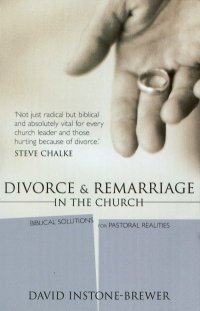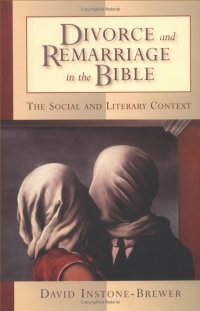

|
Reviews
Divorce and Remarriage | ||

|
David Gamble Methodist Recorder, January 23, 2003 |

|
| Full review: | ||
|
I read Divorce and Re-marriage in the Bible as the mem-bers of the General Synod of the Church of England were debating their report on Mar-riage in Church after Divorce, and making the historic deci-sion to remove the restrictions prohibiting marriage in church after divorce (in appropriate circumstances). Before the de-cision, about 10 per cent of Church of England marriage involved divorced people. Experience knows what will hap-pen now and whether that Church's experience will soon come to reflect the position in the Methodist Church where more than 60 per cent of mar-riages each year involve at least one person who has been div-orced? Given the heat and passion of some of the views expressed at General Synod, it was inter-esting to return to the cool prose of Instone Brewer's book. The author is a research fellow at Tyndale House in Cam-bridge. His book is an academic volume, with no illustra-tions, hundreds of footnotes and many of the biblical quo-tes in their original Hebrew or Greek (though always translat-ed). The book's basic argument is that biblical teaching and, in particular, that of Jesus and Paul on divorce and remarria-ge is not as simple as it some-times appears and has tradi-tionally been expressed. This argument is made by looking closely at the context in which the biblical texts were written. The author explores other texts from the ancient Near East and Judaism, along with other historical evidence from the first-century Jewish and Greco-Roman world, to look at the place of divorce and remarriage in contempo-rary Jewish and surrounding cultures. He suggests that at the time of Jesus there was broad agree-ment about certain grounds for divorce, hut a major dis-agreement between different rabbinic schools on one par-ticular ground. It is into this argument that Jesus is drawn in his recorded comments on the subject. The New Testa-ment's silence on Jesus' response to the other, generally accepted, grounds is taken to mean he also accepted them. To say any more in a short review would be to enter into details that would require a special edition of the Meth-odist Recorder. Suffice it to say that I found this a fasci-nating read and a persuasive argument. It forced me to reconsider much that I had taken for granted in my understanding of what the New Testament says on one of today's most important issues. However, in many ways, from a pragmatic point of view in 21st century Britain the argument has now moved on. Those Christians who accept that in appropriate cir-cumstances divorced people may marry in church have used other arguments. But this book may make them feel even more comfortable about their position. • The Rev David Gamble is the secretary for Pastoral Care and Personal Relationships in the Methodist Church Connexional Team.
|
||
| Read more reviews... | ||
Version
-for ministers
-for academics
-for everyone
Summary
Questions/
Comments
& Replies